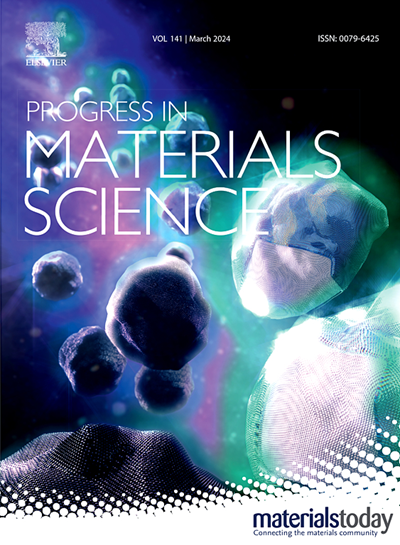Cooling innovations: Elastocaloric shape memory alloys, manufacturing, simulation, and refrigerator
IF 40
1区 材料科学
Q1 MATERIALS SCIENCE, MULTIDISCIPLINARY
引用次数: 0
Abstract
Elastocaloric (eC) cooling, driven by the elastocaloric effect (eCE) in shape memory alloys (SMAs), presents a sustainable and efficient alternative to conventional refrigeration technologies. This review provides a comprehensive overview of recent advancements in eC cooling, covering fundamental principles, thermodynamics, and material performance. The discussion includes the mechanisms of eCE, martensitic transformations in various SMA systems (e.g., TiNi-based, Heusler-type, Cu-based, Fe-based), and key factors affecting cooling efficiency and cyclic stability. Advanced manufacturing techniques, including additive manufacturing, directional solidification, and heat treatments, are highlighted for their role in optimizing material properties. Additionally, the review explores multi-scale simulations and machine learning approaches for material design and performance prediction. The integration of eCE materials into prototypes is discussed, with a focus on thermodynamic cycles, prototype designs, performance evaluations, and potential applications. By addressing current challenges and opportunities, this work aims to guide future research and development toward the practical implementation of eC cooling technologies.

冷却创新:弹性热形状记忆合金,制造,模拟和冰箱
弹性热(eC)冷却是由形状记忆合金(sma)中的弹性热效应(eCE)驱动的,是传统制冷技术的一种可持续和高效的替代方案。这篇综述提供了eC冷却的最新进展的全面概述,涵盖基本原理,热力学和材料性能。讨论了各种SMA体系(如ti基、heusler型、cu基、fe基)中eCE、马氏体相变的机理,以及影响冷却效率和循环稳定性的关键因素。先进的制造技术,包括增材制造、定向凝固和热处理,因其在优化材料性能方面的作用而受到重视。此外,本文还探讨了材料设计和性能预测的多尺度模拟和机器学习方法。将eCE材料集成到原型中进行了讨论,重点是热力学循环、原型设计、性能评估和潜在的应用。通过解决当前的挑战和机遇,这项工作旨在指导未来的研究和发展,朝着eC冷却技术的实际实施。
本文章由计算机程序翻译,如有差异,请以英文原文为准。
求助全文
约1分钟内获得全文
求助全文
来源期刊

Progress in Materials Science
工程技术-材料科学:综合
CiteScore
59.60
自引率
0.80%
发文量
101
审稿时长
11.4 months
期刊介绍:
Progress in Materials Science is a journal that publishes authoritative and critical reviews of recent advances in the science of materials. The focus of the journal is on the fundamental aspects of materials science, particularly those concerning microstructure and nanostructure and their relationship to properties. Emphasis is also placed on the thermodynamics, kinetics, mechanisms, and modeling of processes within materials, as well as the understanding of material properties in engineering and other applications.
The journal welcomes reviews from authors who are active leaders in the field of materials science and have a strong scientific track record. Materials of interest include metallic, ceramic, polymeric, biological, medical, and composite materials in all forms.
Manuscripts submitted to Progress in Materials Science are generally longer than those found in other research journals. While the focus is on invited reviews, interested authors may submit a proposal for consideration. Non-invited manuscripts are required to be preceded by the submission of a proposal. Authors publishing in Progress in Materials Science have the option to publish their research via subscription or open access. Open access publication requires the author or research funder to meet a publication fee (APC).
Abstracting and indexing services for Progress in Materials Science include Current Contents, Science Citation Index Expanded, Materials Science Citation Index, Chemical Abstracts, Engineering Index, INSPEC, and Scopus.
 求助内容:
求助内容: 应助结果提醒方式:
应助结果提醒方式:


